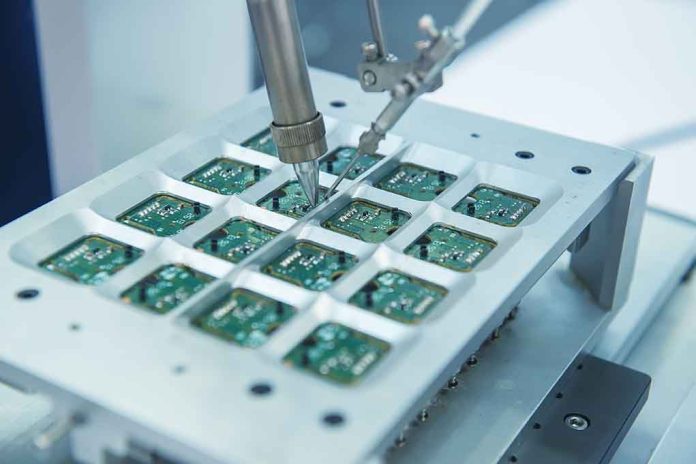
The U.S. Commerce Department has tightened export rules on AI chips to foreign data centers, targeting China’s technological ambitions and raising concerns about global AI development.
At a Glance
- Foreign data centers must now apply for approval to import U.S. advanced AI chips
- The new rule aims to prevent China from using AI for military and surveillance purposes
- Data centers must disclose customer information and security plans
- The U.S. is also slowing AI chip sales to the Middle East pending a security review
- The policy change highlights growing international tensions over technological advancements
Expanded Export Controls Target China’s AI Ambitions
In a move that underscores growing concerns over national security, the U.S. Commerce Department has implemented stricter export rules for advanced AI and computing chips destined for foreign data centers. This latest policy adjustment, primarily aimed at curbing China’s technological progress, requires overseas data centers to secure approval before importing cutting-edge American AI chips.
The new regulations reflect the U.S. government’s heightened vigilance against potential misuse of AI technology by the Chinese Communist Party (CCP). Intelligence reports suggest that the CCP intends to harness AI capabilities for mass surveillance and the development of intelligent weapons platforms, prompting swift action from American authorities.
Stringent Requirements for Foreign Data Centers
Under the updated rules, foreign data centers housing advanced AI facilities must now apply for approval as a “Validated End User” (VEU). This process involves extensive disclosure requirements, including information about current and potential customers, any business ties with blacklisted entities, and comprehensive security and risk management plans.
“The U.S. Commerce Department on Monday expanded an export rule to require foreign data centers to apply for approval before they can import American advanced computing and artificial intelligence (AI) chips, citing national security threats mainly posed by the Chinese regime.
“AI is the quintessential dual-use technology; it is in the interest of U.S. national security to work with industry and partner governments to develop a secure global technology ecosystem,” said Thea D. Rozman Kendler, assistant secretary of Commerce for Export Administration, in a press release.
The U.S. intelligence community has recognized that the Chinese Communist Party (CCP) intends to use “AI for mass surveillance and intelligent weapons platforms,” according to the Commerce Department.
According to the Epoch Times, “When evaluating the eligibility of an end-user, agencies would consider the status of export controls in the eligible destination and adherence to multilateral export control regimes of the government of the eligible destination; this information, among other things, may also be the subject of government-to-government assurances,” the bureau wrote in the rule update note.”
The Bureau of Industry and Security may also seek additional assurances from host country governments, potentially including on-site reviews and security commitments. This level of scrutiny highlights the U.S. government’s determination to prevent the diversion of advanced AI technology to unauthorized users or purposes.
Middle East AI Chip Sales Under Review
The Commerce Department’s actions extend beyond China, with recent reports indicating a slowdown in the approval of licenses for large-scale AI chip exports to Middle Eastern countries. This cautious approach stems from ongoing national security reviews of AI development in the region.
The focus on high-volume sales to countries like the United Arab Emirates and Saudi Arabia underscores concerns about the potential for these nations to become conduits for restricted technology to reach China or other adversaries. This development adds another layer of complexity to the global AI chip market and highlights the delicate balance between fostering technological advancement and safeguarding national security interests.
Global Implications and Industry Response
The tightening of export controls has far-reaching implications for the global tech industry. Major chipmakers like Nvidia and AMD face potential revenue impacts as their ability to sell to certain markets becomes more restricted. Meanwhile, countries aiming to develop their AI capabilities may find themselves caught in the crossfire of U.S.-China technological tensions.
As the situation evolves, industry leaders and policymakers worldwide are closely monitoring developments. The U.S. government’s actions signal a clear intent to maintain technological superiority and prevent adversaries from gaining access to cutting-edge AI capabilities. However, striking the right balance between security concerns and fostering global innovation remains a significant challenge in an increasingly interconnected world.
Sources:
- https://www.theepochtimes.com/china/us-issues-new-ai-export-rule-targeting-ccp-threat-5732839
- https://www.usnews.com/news/top-news/articles/2024-09-30/us-sets-new-rule-that-could-spur-ai-chips-to-the-middle-east
- https://www.bloomberg.com/news/articles/2024-05-30/us-officials-rein-in-ai-chip-sales-to-middle-east-by-nvidia-amd
- https://exportcontrol.lbl.gov/a-bigger-yard-a-higher-fence-understanding-biss-expanded-controls-on-advanced-computing-exports/
- https://www.business-standard.com/world-news/us-slows-licence-approvals-for-ai-chip-exports-to-prevent-resale-to-china-124053100906_1.html
- https://www.semafor.com/article/09/13/2024/how-the-uae-got-the-us-to-bless-its-ai-ambitions
- https://www.cio.com/article/3493017/chinese-firms-bypass-us-export-restrictions-on-ai-chips-using-aws-cloud.html
- https://datamatters.sidley.com/2023/11/01/new-export-controls-on-advanced-computing-and-semiconductor-manufacturing-five-key-takeaways/
- https://www.cnas.org/publications/reports/preventing-ai-chip-smuggling-to-china
- https://www.cov.com/en/news-and-insights/insights/2024/04/us-export-controls-developments-new-advanced-computing-and-semiconductor-manufacturing-equipment-controls-sdn-related-end-user-controls-and-controls-on-nicaragua










